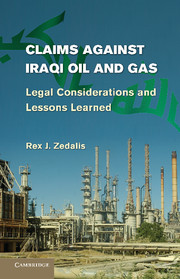3 - The Development and Background of Security Council Resolutions 1859 and 1905
Published online by Cambridge University Press: 05 August 2011
Summary
Introduction
The complications associated with the odious debt theory were not only considerably avoided by the debt settlement arrangements fashioned in the context of the Paris Club, IDRO negotiations, and other bilateral and multilateral debt-relief efforts but also by the UN adoption of the Security Council resolutions that address the protection of Iraqi oil and gas and proceeds from their sale from claims by creditors. As previously mentioned, these represent an effort by the community of nations to exercise its authority under article 25 of the UN Charter to alter the thrust of general international law (e.g., ex injuria, postliminium, and the laws of war) and national law dealing with debts incident to international transactions, of holding Iraq's “feet to the fire” on its debts, and of moving in the distinct direction of providing protection from legal claims. At the outset of discussing the development and evolution of these Security Council resolutions, and before the chapters of Part Three discuss the specific legal issues presented by the terms of the resolutions, it is important to point out that the resolutions do not protect against claims arising after the restoration of Iraqi independence by the transfer of power from the Coalition Provisional Authority (CPA) in late June 2004. Restated, debts that date from the Saddam era – and that period elapsing between Saddam Hussein's removal from power and the transfer of governmental sovereignty from the CPA to the Iraqi people – are subject to the insulation provided by the current Security Council resolution 1905.
- Type
- Chapter
- Information
- Claims against Iraqi Oil and GasLegal Considerations and Lessons Learned, pp. 47 - 70Publisher: Cambridge University PressPrint publication year: 2010



